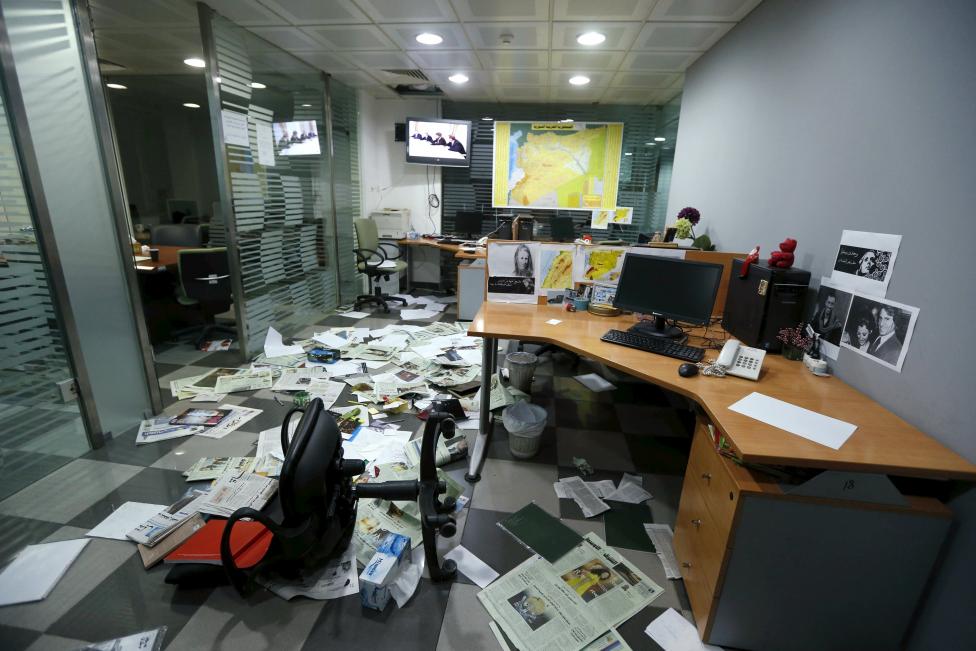Now, after the storm has calmed down following the cartoon on Lebanon, which was published in Asharq Al-Awsat on Friday, the different stances on it have been brought to light.
As ordinary as it may seem, some people have misread the cartoon and interpreted it wrongly, stirring uproar in the country. Others used it politically for temporary benefits; however, some preferred to use it in order to justify a brutal attack, not only against the Asharq Al Awsat’s offices in Beirut, but also against the Lebanese and Arab media, unfortunately.
With all respect to all those who disagree with the cartoon, they were supposed to be the first to defend it as a concept, regardless of their disagreement with its content.
It is sad to react brutally against an opinion that was expressed using a cartoon.
Regardless of Asharq Al-Awsat’s editorial family’s opinion regarding the cartoon- which is a comic drawing tackling the political situation Lebanon is experiencing without a president, a legislative authority and almost without an executive authority- one should lay emphasis on firm professionalism.
Cartoons, just like written articles, are used around the world by all media outlets. Both solely reflect their creators’ opinions and not the newspapers’.
This does not exempt any newspaper from the legal consequences, yet the editorial shan’t be considered a reflection of the newspaper’s stance.
What proves this fact is that some cartoons do not fall in line with the newspaper’s editorial family’s stances, yet they still end up being published. After all, cartoonists have their own opinions and thoughts which they let out using their pencils.
But if we went on punishing every newspaper for its comics and articles, then every newspaper in Lebanon would be found guilty and would be closed by now.
Asharq Al-Awsat will never change; it will continue to be as it has always been since its foundation, committed to the professional norms, always objective and willing to accept any criticism.
Whoever brutally expressed their opinion regarding the cartoon, should have known that they could have expressed their anger on one of the newspaper’s pages, a right they own.
Every newspaper is subjected to criticism, yet it is media’s duty to provide the right of reply for all.
Asharq Al-Awsat is the first to respect this right and implement it, opposing the use of violence to speak out which puts everyone at risk, not only this newspaper.
The Lebanese people, themselves, know very well that Asharq Al-Awsat have always presented balanced opinions on all Lebanese matters.
However, what came to our surprise was the Lebanese media, which blamed Asharq Al-Awsat and confused between the newspaper as an institution and a writer or a cartoonist who expressed his opinion.
Again, Asharq Al-Awsat can neither offend nations nor people, and regarding what some writers express, they are to be asked about their point of views.
What I am trying to deliver here is, of course, addressed to the wise Lebanese and not the so-called Hezbollah’s Lebanese, whom we’ve had enough of their violence and incitement against the newspaper.
Nawaf al-Moussawi, who mainly speaks on behalf of Hezbollah to Western media sources, defended those who hung banners cursing Saudi Arabia by issuing a statement describing the people’s rights and their freedom of speech in Lebanon. He also added back then, that by prosecuting the aggressors, the Lebanese authorities are violating the Lebanese laws that guarantee freedom of expression.
This is the freedom of expression in the new Lebanon; the country that was thousands of miles ahead of others before its kidnap by a militia.
Enjoy the concept of your freedom that does not represent the Lebanon we know!
